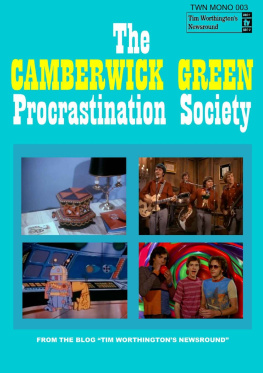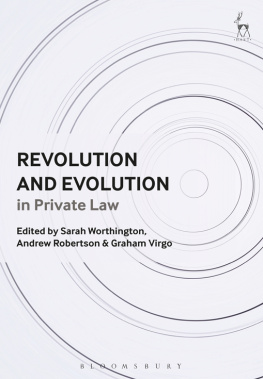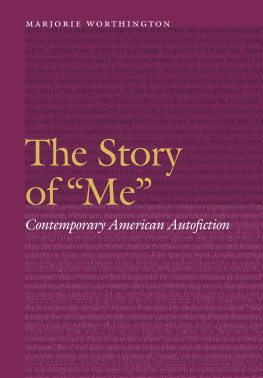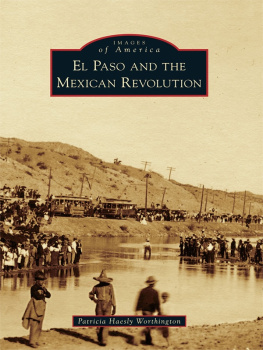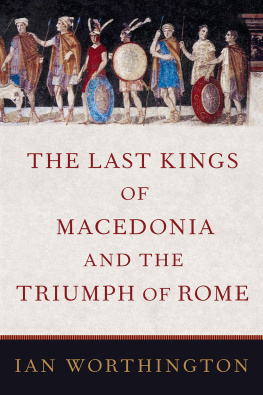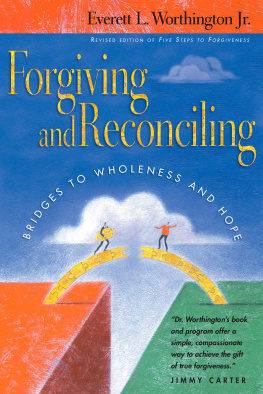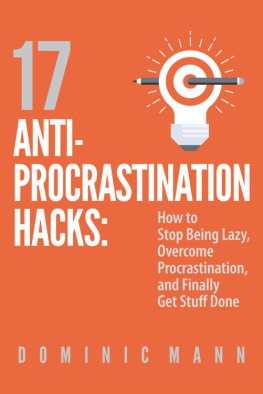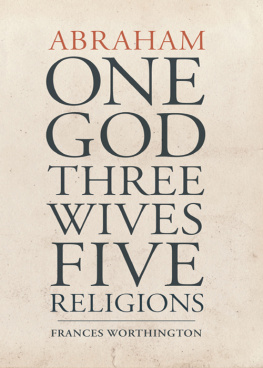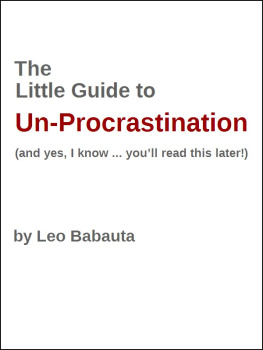Worthington - The Camberwick Green Procrastination Society
Here you can read online Worthington - The Camberwick Green Procrastination Society full text of the book (entire story) in english for free. Download pdf and epub, get meaning, cover and reviews about this ebook. year: 2016, genre: Home and family. Description of the work, (preface) as well as reviews are available. Best literature library LitArk.com created for fans of good reading and offers a wide selection of genres:
Romance novel
Science fiction
Adventure
Detective
Science
History
Home and family
Prose
Art
Politics
Computer
Non-fiction
Religion
Business
Children
Humor
Choose a favorite category and find really read worthwhile books. Enjoy immersion in the world of imagination, feel the emotions of the characters or learn something new for yourself, make an fascinating discovery.
- Book:The Camberwick Green Procrastination Society
- Author:
- Genre:
- Year:2016
- Rating:3 / 5
- Favourites:Add to favourites
- Your mark:
- 60
- 1
- 2
- 3
- 4
- 5
The Camberwick Green Procrastination Society: summary, description and annotation
We offer to read an annotation, description, summary or preface (depends on what the author of the book "The Camberwick Green Procrastination Society" wrote himself). If you haven't found the necessary information about the book — write in the comments, we will try to find it.
The Camberwick Green Procrastination Society — read online for free the complete book (whole text) full work
Below is the text of the book, divided by pages. System saving the place of the last page read, allows you to conveniently read the book "The Camberwick Green Procrastination Society" online for free, without having to search again every time where you left off. Put a bookmark, and you can go to the page where you finished reading at any time.
Font size:
Interval:
Bookmark:
The Camberwick Green Procrastination Society
Readers of Tim Worthingtons blog will know that whenever hes supposed to be working on something more substantial, he starts writing about Camberwick Green instead. And The Monkees, and Boss Cat, and Hardwicke House, and radio comedy, and, well, pretty much anything else other than the task at hand.
As a consequence, Tim Worthingtons Newsround has featured many popular and acclaimed articles, the best of which are now included here in expanded form with some previously unpublished pieces and even a couple of extras.
Theres the story of what Jimi Hendrix was really watching when he wrote The Wind Cries Mary, a fresh look at the disastrous ITV sitcom Days Like These, some showing off about having found an off-air recording of a lost TV show, and lots more besides. The overwhelming majority of it involving Camberwick Green in some capacity.
Every single one of these articles is a productive unproductive waste of time or something erm cant I go back to talking about Rubiks Magic again?, says writer Tim Worthington.
Tim of course is well qualified to say this, having written material for a host of television and radio programmes on a vast variety of subjects documentary and documentary.
Here then is The Camberwick Green Procrastination Society. Let Tim Worthingtons timewasting be a guide to you.
Welcome to The Camberwick Green Procrastination Society!
Authors Note
The Camberwick Green Procrastination Society was originally conceived a series of magazine and book layout pastiches, each of them in some way relevant to the subject of the article; Q for Tin Machine, TV Times for Hardwicke House, Look-In for Skiboy etc. The Wait Till Your Father Gets Home one was in the style of my old paper fanzine Paintbox, which presumably about three people will actually have noticed. Anyway, it wasnt possible to replicate this for the Kindle edition, so if youd like to see this as it was originally intended, please tweet a photo of yourself reading the Kindle version and Ill be happy to send the original eBook to you.
The original version also featured a number of short boxouts, again in keeping with the layout styles, adapted from some other articles that didnt make the final cut. Other than the ITV Lunchtime programme listings included at the end, Ive taken the decision to omit these here. It also included a number of pastiche adverts on behalf of friends and wellwishers which didnt really fit here; you can now find these on the blog post accompanying this new edition.
And finally, something that was never in the original version the acknowledgements! Thanks for their help in various ways to Ben Baker, Justin Lewis, Dave Bryant, Stephen OBrien, Richard Herring, Tanya Jones, Garreth F. Hirons, John Connors, Dave Rolinson, Bob Stanley, James Gent, Nicholas Pegg, Iain Lee, Steve Williams, Chris Hughes, Louis Barfe, Mark Ayres, Gareth Roberts, Miwk Publishing, Graham Kibble-White and Sam Bain, who contacted me out of the blue to say how much he enjoyed the article on Days Like These. I really wasnt expecting that.
The Best Pictures Are In The (Radio) Times
The simple, long-lost thrill of researching popular culture of the past in the pre-Internet era is a subject that I've talked about extensively before - and yes, you guessed it, it's a subject that I'm about to talk about extensively yet again.
Back in the days when the closest evolutionary relative of IMDB was those books called things like Variety's Sci-Fi Enthusiast's Guide To Out Of This World Movie Credits From Space, which were produced to such high and exacting standards that practically every page had half line gaps in the middle of words, the absolute and almost inconceivably exotic researching holy grail was access to back issues of Radio Times and TV Times.
Definitive, unarguable (well, sort of - but that's something that would come to light much later) records of what had been on radio and TV, who had appeared in and made it, and where and when it went out, and all of it without having to wade through interminable wittering about Project UFO first. Of course, if for some strange reason you did want to know about the UK transmissions of Project UFO, then you could find them in there too, but that's by the by.
Eventually, and more by accident than design, I did manage to locate a collection of bound volumes in the awe-inspiring city centre library; although they would later restrict access to dedicated researchers who were prepared to sign official-looking forms and then wait twenty minutes while the staff mysteriously disappeared and returned with the requested copies occupying about a sixteenth of the available space on the world's squeakiest trolley, back then they were just sitting on a shelf and you essentially had the free run of TV listings from 1962 to date.
Unfortunately this did mean that some prat had already gone through and torn out all of the pages referring to Doctor Who, or worse still carefully levered them out with a craft knife leaving damaging lacerations on all of the surrounding pages too, but in all honesty that was really just a minor annoyance. There was so much more in there to find out about than the already overdocumented Doctor Who, and that so much more was precisely what I was in search of. There was, if you will, so much more than TV Times in TV Times magazine. Except that doesn't really work as Doctor Who was in the Radio Times. But you get the general idea.
Suddenly, there were so many longstanding back-of-the-mind questions that could quite conceivably be answered. What were the storylines of the untransmitted episodes of Hardwicke House? Did Channel 4 really show a documentary with clips from Video Nasties? Was there any truth in the rumour that Monty Python's Flying Circus hadn't been properly repeated prior to 1986? Didn't TV Times used to use bizarre 'genre' icons in their listings? Did the abandoned Not The Nine O'Clock News launch make it as far as being scheduled? Was Lenny Henry really a DJ on Radio 1? What about that reference somewhere once to a Billy Liar TV series? Had I just imagined Rubovia? And what in the name of all that is sane and rational was Whoops Baghdad? All of these questions, and more, would soon find their sometimes surprising resolutions. But what I looked up first was something else entirely.
Camberwick Green had been quietly retired from the BBC's lunchtime children's schedules in 1985 - having been shown over thirty times since its debut in 1966 - and like any other TV or radio show (or indeed film) that had been consigned to the archive shelves in the days before there was the technology or impetus to sell it all back to us constantly, it had already slipped into a sort of cultural limbo. You didn't have to look very far to find evidence that it had existed, of course, but the actual show itself already seemed intangibly remote and distant, far in the subconscious depths of character songs drilled into your memory by repetition and fraught recollections of never being quite sure about that clown in the opening and closing titles. It was something that had once been a permanent fixture in the background but had since retreated inaccessibly into a musical box marked the past, and that sense of the inaccessible recent past was what drove me to look up its very first transmission.
And there it was - Monday 3rd January 1966, 1.30pm on BBC1, an episode billed as 1: Peter The Postman and described as For the very young. To be honest, all of the handful of accompanying credits were details that I knew already anyway, involving names that were all too familiar from the clown-rotated credit scroller, but what was really arresting was the small accompanying illustration of the aforementioned Peter The Postman, and a single line in italics at the foot of the listing reading See page 19. And on page 19, there it was a full-size version of the artwork, featuring Peter Hazel standing atop the Music Box (although for some reason he had actually been drawn taller than it), accompanied by a short and noticeably hyperbole-lacking piece introducing the various characters, hinting at (though stopping short of explicitly stating) its status as the first truly independent production to be made for the BBC, and handily explaining the stop-motion animation process for the benefit of question-plagued parents.
Next pageFont size:
Interval:
Bookmark:
Similar books «The Camberwick Green Procrastination Society»
Look at similar books to The Camberwick Green Procrastination Society. We have selected literature similar in name and meaning in the hope of providing readers with more options to find new, interesting, not yet read works.
Discussion, reviews of the book The Camberwick Green Procrastination Society and just readers' own opinions. Leave your comments, write what you think about the work, its meaning or the main characters. Specify what exactly you liked and what you didn't like, and why you think so.

